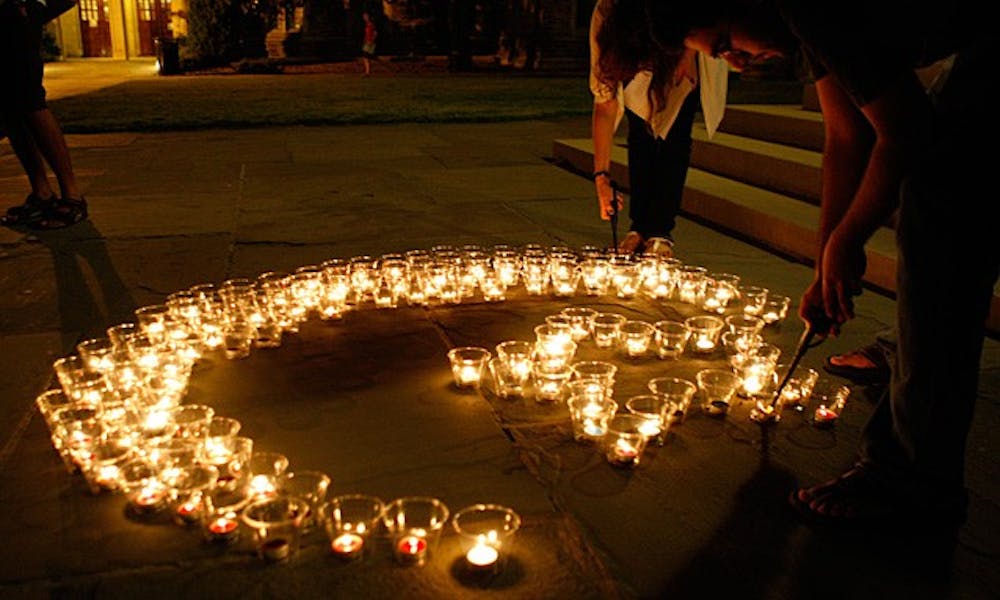Twenty million people are suffering. Thousands are dead. One-fifth of the country is underwater.
The flooding in Pakistan is the worst disaster that U.N. Secretary-General Ban Ki-moon has ever seen, but some Pakistani students on campus feel that the situation has barely registered on their peers’ radar.
Last night, they tried to change that.
At a candlelight vigil on the Chapel steps, about 100 students and faculty heard firs-hand accounts of the devastation in the region.
“It seems that CNN is about the only 24-hour news outlet that has put an important reporter to cover the disaster,” said Ebrahim Moosa, associate professor of Islamic studies. “It struck me that there is something lacking in the global empathy for Pakistan right now. Clearly, the Pakistani government doesn’t always get the best press... and that has trickled down to a lack of empathy for the Pakistani people.”
Flooding in the region, which began with the start of seasonal monsoons July 22, has killed about 1,752 people, according to United Nations estimates. The floods have significantly damaged the country’s infrastructure, as the destruction of roads, schools, health facilities and other buildings has left millions displaced. The estimate of victims reportedly exceeds the totals for the 2004 tsunami in the Indian Ocean and the Haitian earthquake combined.
“They have lost everything, their businesses, their houses, basically their lives,” said senior Asad Sheikh, Pakistani Students Association president who spent part of the summer in Pakistan. “People don’t realize the scope of the disaster. It’s not millions [of dollars needed], it’s billions. It’s not years, it’s decades.”
Although many Duke students from Pakistan did not see the destruction first-hand, witnessing the relief efforts was a call to action. Sophomore Raasti Said does not live near the destruction, but said she visited a relief camp about 40 minutes from her home in Karachi this summer.
“What I saw was actually pretty scary. They had no food, they had nothing,” Said said. “When we were giving them rations I was told that I could not give them out myself because I would be ‘lynched’ because they were so desperate.”
In vying for private donations, students must deal with the negative publicity the country’s political policies have garnered. But Sheikh said Pakistan’s public perception should not dampen aid, adding that the entire country has rallied around the devastation.
The United States has led the relief effort—officials announced Aug. 19 that Washington would increase its funding to $150 million.
“Some of the [people affected by the flood] have probably never even heard of America. It’s human suffering that people need to care about, not necessarily Pakistan’s policy,” Sheikh said. “I was able to experience the collective spirit in Pakistan. People in Pakistan... are starting to realize that the U.S. is an ally.”
Tuesday’s vigil was the first campus flood-related event, but student organizations have many fundraising plans in place, including a fast taking place Wednesday. The University has been supportive of student initiatives, Said said.
Moneta said the University is approaching the Pakistan flooding in a similar fashion to the way it handled Hurricane Katrina and previous global natural disasters.
Most money raised as part of the relief efforts is going to nongovernmental organizations such as the United Nations Children’s Fund as opposed to going directly to the Pakistani government, largely due to fear of corruption, Sheikh said.
And although the majority of Pakistanis directly affected by the flooding live in the poorest corners of the country, the disaster has touched all segments of society.
“Food prices have been hiked up,” said senior Farah Dadabhoy. “Everything that the whole country needs is locally-grown, and this year there is none of that.”
Although she is now far from Pakistan, sophomore Ruqayya Diwan, who is also from Karachi, said she still considers her native people throughout her daily life at Duke.
“The summer is over, but the suffering goes on,” she said during the ceremony.
Get The Chronicle straight to your inbox
Signup for our weekly newsletter. Cancel at any time.

